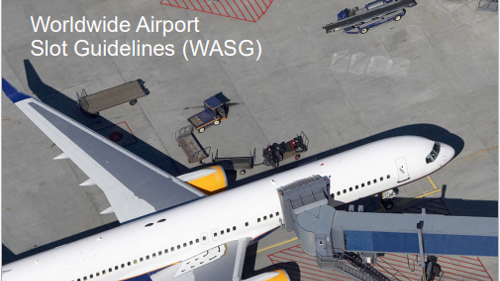
Capacity and Airport Slots
Aviation in Asia-Pacific & Middle East has experienced continuous growth and expansion over the last three decades. Many of the world’s largest airports reside in this region, as well as multiple emerging economies. As these economies continue to grow, more and more of the region’s 4.3 billion inhabitants (representing 60% of the world population) will be able to afford to fly.
Managing airport capacity is essential to ensure efficient access to airport infrastructure and resources. Airport slots are a way to manage capacity, especially at heavily congested airports. In 2019, slot-constrained airports in Asia-Pacific combined served around 2.6 billion passengers or around 28% of global passenger traffic.
Number of Congested Airports by Region in 2019

Source : ACI Asia-Pacific & Middle East
100+ slot constrained airports in Asia-Pacific served
2.6B
Passengers
(2019)
Source : ACI Asia-Pacific & Middle East
100+ slot constrained airports in Asia-Pacific served
28%
Global Passenger Traffic
(2019)
Source : ACI Asia-Pacific & Middle East
The industry is currently coping with the challenges imposed by COVID-19. But in the long run, global traffic is expected to resume to a growth trajectory and the number of airports with slot constraints is expected to continue to increase.
Industry Guidance Document

Industry Guidance Document
The first edition of the Worldwide Airport Slot Guidelines (WASG) was published in June 2020. Endorsed by Airports Council International (ACI), the International Air Transport Association (IATA) and the Worldwide Airport Coordinators Group (WWACG), the guidelines provide the global air transport community with a common set of standards for the management of airport slots at coordinated airports and of planned operations at facilitated airports.
Within the airport community in Asia-Pacific & Middle East, slot matters are guided by the ACI Asia-Pacific Regional Task Force on Slot Allocation with representatives supporting discussions at the global level.
COVID-19 and Slots
As a result of the collapse in demand from the COVID-19 crisis, as of November 2020, over 80% of capacity among the top 20 country pairs, vanished in Asia-Pacific, according to OAG Frequency & Capacity Statistics.
The existing slot rules were never designed to cope with a prolonged industry collapse. Regulators temporarily suspended the rules for Summer and Winter 2020 to give the industry vital breathing space. International air traffic, though, is still expected to return to about 25% of 2019 levels by 2021. In order to preserve connectivity while air traffic recovers, a more flexible system of slot regulation is essential.
In the near term, ACI aims to focus on protecting airport connectivity and gradually incentivize the return of pre-COVID-19 slots to the pool for reallocation in 2022. In the longer term, ACI support an in-depth revision of the Worldwide Slot Guidelines to prepare the aviation industry for the post-COVID-19 future.
Recent Initiatives:
- 26 November 2020 - Aviation industry agrees vital slot use relief
- 13 November 2020 - Airport slot allocation policies should support the recovery of air transport
- 16 June 2020 - Financial relief and evidence-based policies needed for restart and recovery
- 17 March 2020 - ACI World urges a global temporary suspension of airport slot requirements




